- Home
- catt dahman
Time of Grace
Time of Grace Read online
Time of Grace
catt dahman
Copyright.
catt dahman / J. Ellington Ashton Press
© 1990, 2012 catt dahman
ISBN: 978-1480104730
http://www.cattd.com
ALL RIGHTS RESERVED. This book contains material protected under International and Federal Copyright Laws and Treaties. Any unauthorized reprint or use of this material is prohibited. No part of this book, including the cover, poetry, and photos may be reproduced or transmitted in any form or by any means, electronic or mechanical, including photocopying, recording, or by any information storage and retrieval system without express written permission from the author/ publisher. All rights reserved. The author will allow small sections to be reprinted for reviews and on websites.
Poetry used by permission of authors. All rights reserved.
Cover by Robert Zombob Banning. All rights reserved,
The characters, places, and events depicted are fictional and not intended to represent anyone, living or dead. This is a work of fiction.
Thank you to the real David, who always believes.
For Nic who gave me all the joy I have.
For Texarkana, Texas: What a rockin’ place! Places that influenced me: Summerhill Skating Rink, Spring Lake Park, Texarkana College, Texas High parking lot, and Fat Jack’s.
RGW, thanks for sharing.
Photos used by permission of the photographer. All rights reserved.
Thank you to my editor, Jayne Williams, who endures my grammar.
Thank you to my agent, Ericka who has provided friendship as well as advice.
To the Black Lions Sands of time run out, In golden strands. Days do not linger, Nor time move less stay.And all things must pass away.(RGW)In reaching for the unattainable, one suffers the keenest of tortures.(RGW)
Kill the sumbitches…who needs ‘em?(Christopher Goose)
I don’t know why I’m the way I am…if I weren’t, the way I am, I’d be someone else.(David).
Chapter 1
Fall 1995
This is my story, exactly as it happened. I don’t expect anyone to believe it all, and after you read it, I guess you won’t like me very much. Feel free to pass judgment or decide I am a liar; I don’t care. But, it’s all true. God help me, it’s all true.
Chapter 2
Fall 1957
If those years could be summed up in one sentence, then I would probably compose some inspirational line, but it wouldn’t be true. It wouldn’t sit right. It would be like masking a week long, dead body with lilac water. It was a nasty, complicated time that has moldered.
The good old days had some secrets and were not as idyllic as some might think. Well, at least my good old days were not as perfect as people like to say about the 1950s. But here is the worst part: I don’t think I would change much, or rather, I would do most of my life all over again. It’s inevitable, like a tide, and we all know we sink or swim in a tide. I did both.
And guess what? I’d wade right back into that tide, given a replay. How sick is that? I never said I was sane or a great person, did I?
Let me share this: monsters are not big, green beasts, hiding in our closets; we are the monsters, and we stay hungry. Individual lives, secrets, needs, and obsessions all gather to make a kind of cosmic soup, a force that can come into its own terrible power.
Sometimes I consider the clarity of my memories but not too much, or I’d go mad. Every detail is almost crystal clear, and each one leaps at me, unexpectedly, going for my throat, showing up at the corners of my eyes, peripherally. So, never doubt my accounting of the details. If I could bring on amnesia, I would in a heartbeat; in fact, forgetting it all would expunge and kill the monsters that lived on.
Chapter 3
In September of 1957, we were barely into the first semester of junior college, all piss and vinegar with the giddiness of semi-freedom and new experiences. We were mature, Man, and could change the world. We thought so, anyway.
Doesn’t every eighteen-year-old feel invincible, powerful, smart, and right with the world? I think people still feel this way, though not at the same level: pre-Kennedy. We had no idea then about what we were going to face now. Luckily, most faced just the difficulty of real, normal life and not events that would swallow us whole.
Outside the Humanities Building at Texarkana College, I leaned against one of the many pecan trees while Grace thumbed, frowning, through her biology book; we debated about doing our lab assignment. It was still muggy in North East Texas, but I dare anyone to show me a prettier place, so we were cooling off in the shade.
If she had been born later, Grace would have been called beautiful, but she didn’t have those classic looks that were popular in the 1950s.
Later, her look would be called a California look. Her face was too soft, too open, and too natural for that time; her hair was too thick, too long, and too blonde, with almost white streaks mixed with the gold and honey. She didn’t wear the classic lipstick or use the brow pencil over her jade eyes. Grace would have looked more at home a decade later. Grace was just too everything, I think.
She wasn’t reserved or coyly sweet. Smart, she was almost brilliant and sensitive, and she laughed too loud. She was funny. Grace liked Bach, purple, thunderstorms, the wind, freshly mown grass, geese honking, and Christopher Goose, and sometimes she got car sick. There. I can say what she liked, and I can say what she didn’t like, such as paper cuts and spinach, but that isn’t who she was.
Whatever was popular didn’t matter to her, but then she wasn’t rebellious, either. I think she did what she thought best and what she wanted and just didn’t think of it as important; she never thought of herself as that important. I don’t mean she had low self- esteem, either. Grace just didn’t see herself or her behavior as monumental. Did you ever meet someone who was attractive and smart and could do anything well, but she didn’t realize it? That was Grace.
She could have her bad moods or be stubborn, and when she was pushed way too far well….I am ahead of my story, but she could have a fiery, temper, but it was something everyone over-looked because like East Texas weather, it was fast to change to better or at least to be different. She might snicker at someone or make a less-than-stellar observation, but she never went out of her way to hurt anyone and was fast to defend people. Some people swallow pride, dignity, and desire to save other people’s feelings; she was that way.
I sound like her biggest fan? I was, and I still am. Isn’t that part of my problem? I will always see her as perfection, and such a view always causes rot. I always think that had she not met me or met the other monsters, then she would have been somewhere, happy, right now.
If you read the news or watch television, people always say they never expected someone to act a certain way or say they never dreamed someone was capable of certain things. Live next door to a mass murderer with bodies in the basement, and you will swear that you never noticed a thing unusual.
Of, course, not. The screams, the missing people, the blood seeping from under doorways are never a hint, are they? We ignore the things that might cause nightmares. We over-look the fiends of our lives because if we actually began seeing them, we would be terrified, especially when we looked into the mirror.
I digress.
So we were debating, and Bernie Canfield appeared. He had been wildly popular in high school: in athletics and looks, but he had dated only a few girls, so we all thought he would be off to a big university, but gossip was that his folks didn’t have the money.
Bernie picked up pecan shells to toss at my feet. I had gone to school with him, but we were not good friends although we did share a class now. He was handsome, solidly built, and was dark haired. “You finish your sociology paper, David
?”
“Almost. Altruism. What’d you get?” I asked.
“Role modeling. Boring.” He tossed a shell at Grace’s feet. “And your friend is…?”
I introduced them. “We played football together in junior high and high school,” I told her. I didn’t know much else to say about him. He had run, kind of, with a slightly different crowd a lot of the time. I was kind of surprised he had come over, but his main buddies had all gone off to big universities on sports scholarships.
“Are you playing here?” she asked.
“Yep, David and I might catch the eye of a recruiter.”
“Oh sure, I have them knocking down my door.”
Grace laughed at me, “I noticed you had a new front door.”
He pegged my leg with more shells. “What are you two doing?”
Grace told him of the biology lab debate, and he interrupted her, “Wanna go get a soda?”
“Okay.” She shrugged. It wasn’t her nature to fend shy. She looked to me.
I might have said something to stop them from going, but I said I was going to lab instead of waiting to be invited to tag along. I was a bit irritated that he hadn’t even hesitated; I might have been dating her. Neither talked me out of it, so I watched them walk away; that was when I lost her although I didn’t know it or know I cared.
Chapter 4
I met Grace back in May. In the Dairy Dream, I saw a buddy, Will Lofton, sitting with a pretty girl, sauntered over, and got an introduction. I knew, fast, that she was smart and funny, but it was another part of my anatomy that really noticed her; I thought she was gorgeous. Will, who had scores of girls chasing him and even more that he chased, was clearly not chasing her. He was flirting with every girl around, and she laughed as he did it, picking out possible choices for him. She wasn’t chasing him, either. No sparks were flying. They even attended the same church.
Later, I planned to get her information from Will and maybe hook up with her, but I was about to graduate from high school, and there were grades, a prom, graduation, summer, college, other girls, and a million other things on my mind right then. I did think of her when I went by the Dairy Dream, but I never seemed to be thinking of her when Will was available, which at that time, was less than normal, as he scrambled, doing the same things. I pretty much dismissed her.
I mean, I liked girls, sports, all the normal things, but the very idea of college and growing up was so new that it kind of eclipsed everything else. I was excited about going to college.
June came, and a For Sale sign went up next door. In July, yep, you guessed it, the neighbors moved in, and you know who it was? serendipitous, Man. God has a wicked sense of humor.
Mom came back after meeting the neighbors, amid their boxes and crates and full of gossip; my mom was fast like that. She had taken cookies over and brought back their entire life stories. She knew things about people before they knew them.
Scarfing cornflakes while reading the sports section, I ignored most of her gossip. The Cubs had lost to the Redlegs 6-8. A few weeks later, and I wouldn’t have heard a word she said, when Mickey Mantle hit his number two hundred. She said something about a girl and about parents who were very intense and not very friendly.
“ A girl your age,” she was saying.
“Ummm?” Mild interest. I ate the last cornflake.
“…pretty blonde.”
When Moms said pretty, it always turned out to be a description of a real bovine.
“Her name is Grace,” she continued, “isn’t that a pretty name?”
“Grace?” I was on my feet. The person might have been any blonde named Grace who was pretty, but I knew this Grace was the same.
So I changed out of my car-washing duds and combed my hair while humming Elvis’ “All Shook Up”. Don’t think my mom didn’t notice; she was smirking and snapped me with a kitchen towel as I darted out the door.
I was out and across my back lawn and into the front like lightning.
There was Grace, carrying a box, wearing pedal pushers and a floppy big shirt, and her hair was pulled back in a pony tail. She looked, even then, out of place. It’s best to understand how ill-fitted she was if you think of a movie, black and white, with a character who is in color. She just didn’t fit.
“Small world, huh?” I asked, mentally kicking myself for saying such a stupid thing. I was not that smooth with girls.
“It’s a huge world, actually.” She handed me the box and got another one to carry, motioning me to follow. Now, that was how she was; it wasn’t that she wanted someone to do her work for her or expected it, but she would have grabbed a box had it been she in my place. It just didn’t dawn on her not to hand me a box to carry. “But why do you think it is small?”
“Well, you’re moving in.”
“And that makes it small?”
“We met in May.”
“We did?”
“At the Dairy Dream, you were with Will Lofton. He’s my best friend.”
“He goes to my church. Small world. Yet, you say we met?
“I was there with Will? In May? Are you sure?”
“Yep. You had a glass of tea and not a soda.” I could have described more, but I already felt my face burning; she didn’t remember me. I had decided girls were devils; one minute they made a boy feel ten feet tall, warm and wonderful, and in the next, they made a boy feel like a dope.
“How odd. Tea? In May?” We set the boxes down in her room. I sat on her unmade bed, feeling pretty stupid and wondering how I would avoid her the rest of my life.
“Thanks, David.”
“No problem.” I stared at the floor, then at my hands, then the ceiling as she arranged some items, and I wondered how to vanish. Then it hit me. “You know my name.”
“Well, yes, I do.”
“But you have no memory of me, so how do you know my name?”
“Maybe your mother told me.”
Right. Okay. Now I felt a lot more stupid. “Well, I did meet you. Sorry, you don’t remember me.”
“I don’t think I remember a thing, and I certainly don’t remember that ugly red and white checkered shirt you were wearing that day. Really, it does nothing for you.”
That was the first time I saw her mischievous grin and heard her unloose peals of laughter, but it wasn’t the last. I laughed with her, mostly in relief that I hadn’t made a total fool of myself.
“How many more boxes?”
“Thirty, maybe.” She grinned, and I knew it would take a while to be able to read whether she was teasing or being serious. But I did learn and quickly so that I was not at her mercy, but that was how we spent the first day of our friendship. It was immediate comfort after that, a no effort companionship.
Chapter 5
Over the next weeks, I introduced her to boys and girls I knew. Some of the girls warmed to her; a few of the boys asked her out, but she declined dates in ways that made them feel good, not shot down.
She told me she was much too busy to date, but I knew she spent Friday and Saturday nights with her family or reading in her room. Busy, to her, meant she was doing something that interested her, such as staring at clouds or reading or painting. While she did shop with her mother some weekends, mostly, it was a summer of our ‘hanging out’.
Sometimes I took her driving around. We drove past Grim Stadium, where the football games would be played in the fall, to the Dairy Queen on New Boston Road, circled through the A&W Drive-In on State Line Avenue, zoomed to the Arkansas side to Lacy’s, and then to Lee’s on Seventh Street. It was the strip, and we drove it relentlessly.
Grace and I went swimming a lot at the lake, sometimes with a group, sometimes just us, but those times alone weren’t a date. They were all about her doing something interesting that I happened to be interested in as well. She and I both loved swimming, so we swam together. Grace, alone or in a group, was mostly by herself. When the rest were chattering away, she might be on the shore, looking for interesting stones or pieces o
f wood.
Don’t get me wrong. She was fun and cheerful company, and I didn’t feel ignored. It was more than that. With Grace, you knew even if she were with you, a large part of her wasn’t there but behind some thick wall. She entertained herself.
Maybe no one saw that but me; I never heard anyone comment, but it was there. Grace held most of herself back, and my take on it was that what she held back was infinite, deep and endless, intensity she didn’t share. Sometimes I was curious and wanted to see that side, but mostly, I almost feared it. Behind that wall, she was breakable, or maybe she was one who could break people.
Her parents were always polite, but I never felt welcomed particularly, but then, Grace never felt welcomed, either. There was a division between her and her parents, a sense that she was a project they worked on, but that she didn’t agree to.
By them, I was treated as a passing friend who kept her busy but was never a real friend. They were never cruel or cold to Grace or to me, but they had eyes on the bigger prize. While they were not rich, they had expectations of living, through Grace, a much better life. In ways, it was sad that they didn’t recognize how perfect she already was. It wasn’t a horrible life. Until she was mostly grown, they had been, she said, ‘warm and loving’ but had more and more begun to stress her future and her adulthood. Looking back, many parents of that time were the same as they prepared their offspring for the lives they had endured.
Unlike modern times, back then, there was a social consciousness, a conformity that adults were expected to follow or find themselves (gasp) shunned. Behaviors and life choices were just expected. Was it a better time? In ways, maybe. But for those with ears tuned to a different drummer, it could be disastrous. Grace walked the line of individuality and conformity.
We played Monopoly on the porch that summer, swam, ate popcorn at the movies, and played games in the back yard like little kids. Not one day passed that we didn’t talk or do something together, but we acted like siblings, and neither set of parents ever suggested it was anything more than friendship because it wasn’t, that we knew of. We shared hopes, dreams, and memories as we lay on the roof of my house and watched the stars, and to be honest, I would have never told a girl I liked that kind of stuff. I could tell her things that guys would laugh about.

 Z Poc: The Lodge
Z Poc: The Lodge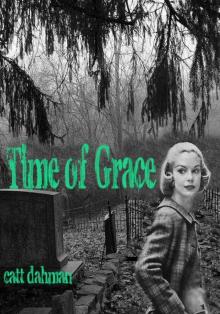 Time of Grace
Time of Grace Alice and Friends
Alice and Friends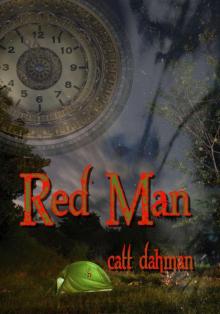 Red Man
Red Man George's Terms: A Zombie Novel (Z Is For Zombie Book 1)
George's Terms: A Zombie Novel (Z Is For Zombie Book 1) Alice In Wonderhell
Alice In Wonderhell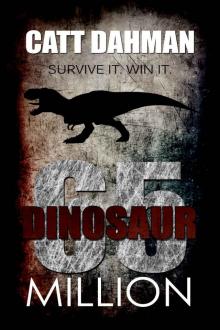 Dinosaur: 65 million
Dinosaur: 65 million Extinction Island 2
Extinction Island 2 Z Poc: Young Brains
Z Poc: Young Brains Of Guilt and Innocence: Institute at the Criminally Insane (Virgil McLendon Thrillers Book 3)
Of Guilt and Innocence: Institute at the Criminally Insane (Virgil McLendon Thrillers Book 3) Smooth
Smooth Extinction Island
Extinction Island Of Lost and Found (the Kingsborough House): Kingsborough House (Virgil McLendon Thrillers Book 4)
Of Lost and Found (the Kingsborough House): Kingsborough House (Virgil McLendon Thrillers Book 4) Titanic 1912: A Lovecraft Mythos Novel
Titanic 1912: A Lovecraft Mythos Novel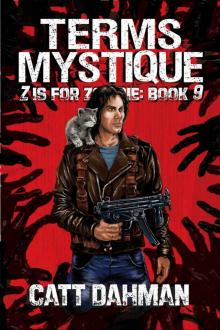 Terms Mystique: Z Is For Zombie 9
Terms Mystique: Z Is For Zombie 9 Wild Boys: Six Shooters and Fangs
Wild Boys: Six Shooters and Fangs When We Were 8
When We Were 8 Louisiana Saturday Night
Louisiana Saturday Night Blood of an Empire: Helen of Sparta
Blood of an Empire: Helen of Sparta Rage: Z Is For Zombie Book 5
Rage: Z Is For Zombie Book 5 Devil's Details: Z Is For Zombie Book 4
Devil's Details: Z Is For Zombie Book 4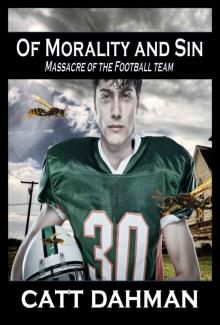 Of Morality and Sin: Massacre of the Football Team (Virgil McLendon Thrillers Book 7)
Of Morality and Sin: Massacre of the Football Team (Virgil McLendon Thrillers Book 7)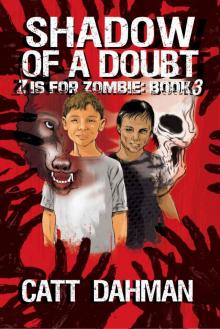 Shadow Of Doubt: Z Is For Zombie Book 3
Shadow Of Doubt: Z Is For Zombie Book 3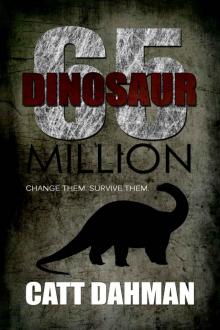 Dinosaur: 65 Million: Book 2 Change Them, Survive Them
Dinosaur: 65 Million: Book 2 Change Them, Survive Them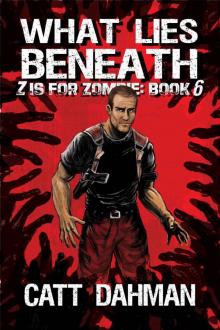 What Lies Beneath: Z is for Zombie Book 6
What Lies Beneath: Z is for Zombie Book 6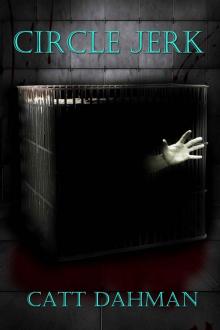 Circle Jerk
Circle Jerk The End of the Road: Z is for Zombie Book 8 (Z is for Zombie: Book)
The End of the Road: Z is for Zombie Book 8 (Z is for Zombie: Book)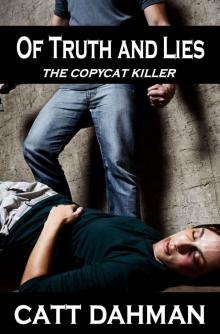 Of Truth and Lies: Hollingsworth Copycat Killer (Virgil McLendon Thrillers Book 5)
Of Truth and Lies: Hollingsworth Copycat Killer (Virgil McLendon Thrillers Book 5)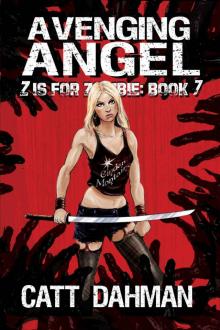 Avenging Angel: Z is for Zombie Book 7
Avenging Angel: Z is for Zombie Book 7 Event Horizon: Z Is For Zombie Book 2
Event Horizon: Z Is For Zombie Book 2 Of Blood and Water: Campground Murders (Virgil McLendon Thrillers Book 1)
Of Blood and Water: Campground Murders (Virgil McLendon Thrillers Book 1)